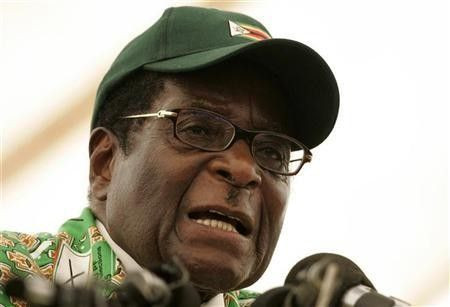Robert Mugabe At 89: A Lonely Old Dictator Running Out Of Time And Peers

Just a day after throwing himself a lavish $600,000 party to celebrate his 89th birthday, Zimbabwe’s President Robert Mugabe told local media that he's “lonely” as most of his contemporaries have long since passed away, leaving him to deal with younger generations of people.
In an interview with the Zimbabwe Broadcasting Corp., Mugabe -- who has ruled the country for 33 years and is now the world’s second oldest head of state after only Shimon Peres of Israel – referred to some of his government’s senior officials as “kids.”
For example, the next oldest person in the government is the administration secretary for Mugabe’s Zanu-PF party, Didymus Mutasa, who is 78; while other officials like Media, Information and Publicity minister Webster Shamu and Information Communication Technology minister Nelson Chamisa are 67 and 33, respectively.
“They [people of my age] are gone and those who remain, you look down upon them because they are young,” Mugabe complained.
“They have not had the same experience, the same length of life and, therefore, the same advantage of gathering as much knowledge and experience as yourself. And so you can’t discuss with them things that happened in the 1930s, or even [the] 1950s. They will not know. There is that limitation.”
Zimbabwe’s NewsDay reported that in recent years, Mugabe has lost many member of his government, including vice-presidents Joshua Mqabuko Nkomo, Simon Muzenda, Joseph Msika and John Landa Nkomo.
All of Mugabe’s siblings, except for Bridgette, who is in a coma, are dead.
Mugabe’s wife, Grace, is 47.
Mugabe added in a plaintive lament: “You take my Cabinet as it is, there is no one I can talk to about how we used to approach girls or we would go to this and that place, riding bicycles. There is no one … You have lost others and sometimes you think of it and it makes you very lonely. The consoling part of it is that, well fine, there are young ones and young minds you can talk to. You can also try to educate, you can also try to relate a bit of history to and so on and so forth. But they remain young ones who listen much more than they share ideas with you.”
After Mugabe, the next oldest world leaders are Abdullah bin Abdul-Aziz, the King of Saudi Arabia (88); Girma Wolde-Giorgis, the president of Ethiopia (88); and Giorgio Napolitano, the president of Italy (87).
Coming close behind are Britain’s Queen Elizabeth II (86) and King Bhumipol Adulyadej of Thailand (85).
Also, even if Mugabe feels lonely and isolated, he should consider himself extremely fortunate – for he has lived much longer than ordinary Zimbabweans can expect to.
According to the World Health Organization (WHO), the average Zimbabwean woman has a life expectancy of only 47 years, while for men, the average is 50 – among the lowest rates in the world. (The global average is 69.2 years)
However, these numbers actually show a significant improvement.
Between 1980 (the year Mugabe seized power) and 2006, the life expectancy of the average Zimbabwe resident plunged from 59.2 to 37, largely due to the devastating effects of high malnutrition and HIV rates.
“Life expectancy has been rising slowly in Zimbabwe. This is to be expected considering the general improvement in the welfare of the people through economic recovery,” Health and Child Welfare Minister Dr Henry Madzorera told the Sunday Mail newspaper.
“Droughts have been pulling us back in terms of nutrition, but, in general, we are better off than we were a few years ago. There have been short-term interventions that have made an impact on survival and longevity in Zimbabwe. These include improvements in the health delivery system, near-universal access to HIV care and treatment as well as the all-out war on maternal and child mortality.”
Madzorera warned though that despite recent gains, Zimbabwe has a long way to go to guarantee the good health of its people.
“For the country to match the global life expectancy rate, there is need to be on guard against the emerging epidemic of non-communicable diseases, which threatens to reverse our gains in the arena of infectious diseases,” he said.
“It is the emphasis on the conditions people are born into, grow, live, work and age that will see us live beyond 70 years on average. Hospitals, clinics, hi-tech medicine and health workers, among others, are all important. However, they are a form of fire-fighting on behalf of those among us who are unfortunate to get sick. As the economy improves, these will also naturally improve.”
© Copyright IBTimes 2025. All rights reserved.





















